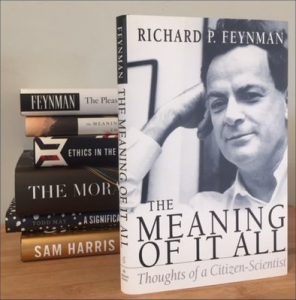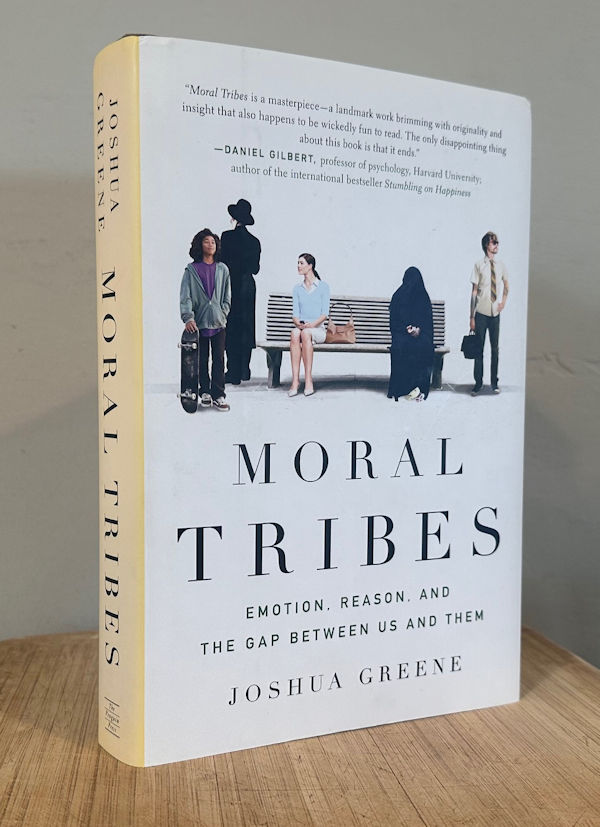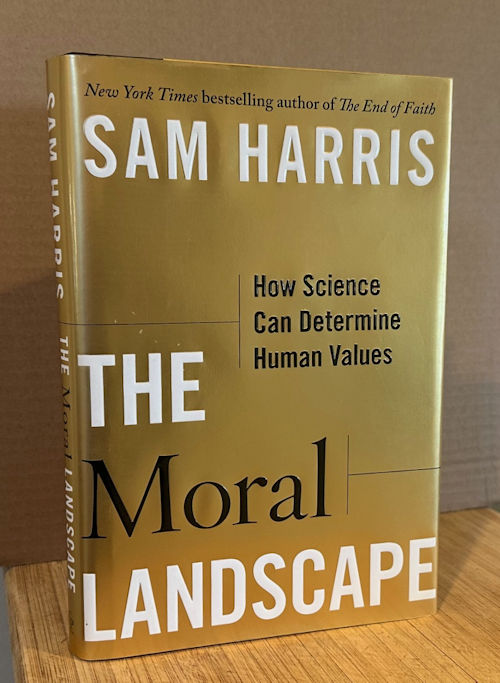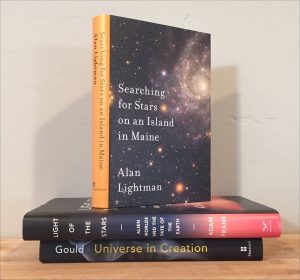 Feynman, Richard P.. 1998. The Meaning of It All: Thoughts of a citizen-scientist. Addison Wesley. ***
Feynman, Richard P.. 1998. The Meaning of It All: Thoughts of a citizen-scientist. Addison Wesley. ***
Three essays delivered as lectures in 1963, concerning science, religion, and public credulousness. Science has three aspects: method, results, technology. Some uncertainty always remains. Similarly with values, as he reflects on why most scientists don’t believe, and how moral values are not affected by loss of belief. And about how little most people understand about our scientific age, politicians who have quick answers to complex problems, a lack of understanding of the complexity of the world, of having a sense of proportion. (post)
 Greene, Joshua. 2013. Moral Tribes: Emotion, Reason, and the Gap Between Us and Them. Penguin. *****
Greene, Joshua. 2013. Moral Tribes: Emotion, Reason, and the Gap Between Us and Them. Penguin. *****
Keying off Garrett Hardin’s “tragedy of the commons,” the author explores the “tragedy of commonsense morality” to show the effects of different moral policies for sharing resources and dealing with conflicts. How did cooperation evolve at all, given Darwinian competition? Morality evolved to enable it, via altruism and unselfishness, as humans formed groups (tribes). But now humanity is in need for a “meta-morality” to avoid conflicts and solve problems among all tribes. Greene summarizes the roots of morality via the Prisoner’s Dilemma, tit for tat, Hobbes’ Leviathan, the trolley problem, etc. The solutions of this morality don’t always work in the modern world. His solution is a modified utilitarianism that he calls “deep pragmatism,” and shows how this approach can be applied, for example, to the abortion dispute. Finally, Greene defends liberalism and explains why he thinks liberal policites make the world happier. He quibbles a bit with implications of Haidt’s Moral Foundations Theory and claims that liberals’ moral tastes are more refined than those of conservatives; the latter have yet to outgrow the tribal morality that is unsuitable to the modern world. Thus liberal nations exhibit the highest levels of quality of life and happiness in the world. And he ends with six rules for modern “herders,” beginning with not trusting your moral instincts — “don’t believe everything you think” — how rights are invoked to end arguments when you have no evidence, how to focus on facts, be aware of our own biases, use common currency (e.g. science) for establishing facts, and giving. A big substantial book that ties together ideas about morality, evolution of the mind, politics, and psychological biases from many other writers (Pinker, Wilson, Haidt, Kahneman, and later reflected by Wallace and Gregg). A second post follows the link here. (post) (Read Apr 2024)
 Harris, Sam. 2010. The Moral Landscape: How Science Can Determine Human Values. Free Press. *** 1/2
Harris, Sam. 2010. The Moral Landscape: How Science Can Determine Human Values. Free Press. *** 1/2
Harris rejects the nostrum that science can tell us nothing about morality, describing a utilitarian policy maximize happiness, or well-being, in a society. That said, he’s not using “science,” in terms of collecting data, formulating and testing hypotheses, and so on, as he is applying reason to arrive at a consistent policy, avoiding the contradictory and incorrect claims that religions make about the nature of reality. His core idea is a physical landscape with peaks and valleys, areas of all-being and suffering respectively. There may be no one best peak — no one correct morality — but there are degrees of well-being that are easily distinguishable. Chapters discuss how moral truth is not subjective; how ideas of good and evil, or right and wrong, are ideas that characterize the well-being of people, and that have derived for evolutionary reasons. About beliefs and cognitive biases and how political conservatism is correlated with dogmatism, inflexibility, etc., and anti-correlated with cognitive complexity and social stability. About religion has declined in most developed societies (except the US) and how religion relies of intuitive sense while brain science has shown the doctrines of religion to be implausible. And finally: there is moral progress in the human race, and reasoning about it is better than relying on religion, “that great engine of ignorance and bigotry.” (post) (Read Reread Jul 2022)
 Lightman, Alan. 2018. Searching for Stars on an Island in Maine. Pantheon. * 1/2
Lightman, Alan. 2018. Searching for Stars on an Island in Maine. Pantheon. * 1/2
Essays that ponder science, religion, and the yearning for meaning, with some lovely naturalist writing, but mushy on the author’s desire for “meaning” outside the scientific evidence of the real world. It’s an example of the bias in human nature that searches for a story for the world that doesn’t really exist. (post)
 Shermer, Michael. 2015. The Moral Arc: How Science and Reason Lead Humanity Toward Truth, Justice, and Freedom. Henry Holt. *****
Shermer, Michael. 2015. The Moral Arc: How Science and Reason Lead Humanity Toward Truth, Justice, and Freedom. Henry Holt. *****
Shermer’s magnus opus, perhaps, spiritual kin to Pinker’s THE BETTER ANGELS OF OUR NATURE and keying off the famous statement by Martin Luther King about the arc of the moral universe. The thesis is that morality has improved over time, through science and reason: better understanding of the real world that has helped us avoid factual errors that generated behaviors our ancestors and their religions took for granted, but which we increasingly regard as immoral. It is not true that science can say nothing about religion, or that morality depends on religion. Key principles include the “principles of interchangeable perspectives” and the virtue of continuous, rather than black and white, thinking. This understanding of the world began with the scientific revolution (Copernicus to Newton) and the Age of Reason and the Enlightenement (Newton to the French Revolution). Religion is not a source of morality or moral progress; when such progress is made, the churches resist it. Religions are tribal and xenophobic by nature. Shermer offers his own Decalogue (which I’ve included on this page) and critiques the traditional set of ten commandments. Shermer has detailed case studies of how morality has improved regarding slaves, women, gays, and animals. And finally he covers issues of moral regress and evil, free will and moral culpability, competing notions of moral justice, and the future of moral progress. Long summary with quotes at the link. (post)
 Wilson, Edward O.. 2014. The Meaning of Human Existence. Liveright. *****
Wilson, Edward O.. 2014. The Meaning of Human Existence. Liveright. *****
A concise summary of the great scientist’s views on the big issues of science and philosophy, summarizing themes from the author’s many other books. Meaning is not about intent and design; humanity’s meaning is a summation of the accidents of history that have brought about our existence. This leads directly to questions of to what extent we direct our own future evolution. He reviews the key concept of group selection, and the inherent conflict with individual selection: “risking oversimplification, individual selection promoted sin, while group selection promoted virtue”, thus the eternal struggle within every person. He revisits the idea of ‘consilience’ between the sciences and humanities; the Enlightenment; the two cultures; how our devotion to stories reflects how the mind works. How the humanities explore the comfort zone of human existence, while science explores continua the humanities cannot perceive (but which some other animals do). Science will mature and stabilize; aliens would know the science and be interested instead in our humanities. He discusses super-organisms; speculates on the nature of intelligent extra-terrestrials, and why aliens could never invade our planet (or we theirs); reviews the collapse of biodiversity; and then reflects about human nature, about instinct, religion (built in to human experience; “regarded by the common people as true, by the wise as false, and by rulers as useful”; motivating the tribalism behind conflicts in the world), and free will (which he suppose exists at least for practical reasons). What is the meaning of human existence? It’s the epic of our species through evolution, prehistory, recorded history, and the potential for what we choose to become. With some final swipes at creationism (“a triumph of blind religious faith over carefully tested fact”), Wilson concludes “If the heuristic and analytic power of science can be joined with the introspective creativity of the humanities, human existence will rise to an infinitely more productive and interesting meaning.” Detailed notes part 1, part 2, part 3, part 4, part 5.





